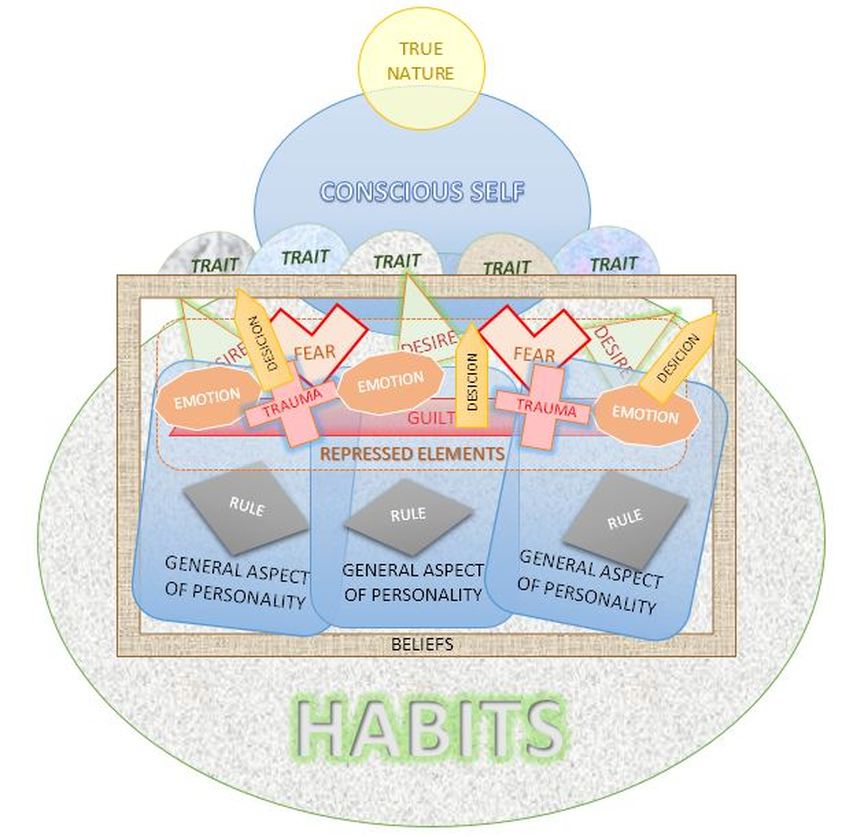AuthorThose who work at the office know pretty well that their greatest enemy is soulless and has wheels. It is the office chair that slowly sucks all the vitality of the body especially the waist, back, shoulders and neck. That is why we recommend for you these four anxiolytic yoga exercises you can do at your desk to relieve your waist, relax the back and drive away any tension. 1. Half Downward Facing Dog: In the classic yoga pose "Downward Facing Dog", soles and palms are flat on the floor and the body forms a "mountain", where the "top" points at the ceiling. The "Half Dog" is an easier version, less demanding and also more relaxing.
Put your palms against the chair or the wall and leave a deep breath. This exercise allows the back to open and stretch. Focus your attention on the area between the neck and back. Take deep breaths and relax. Stay there and count to ten. 2. Seated Twist:
0 Comments
The whole existence is fundamentally indivisible, as all its parts contain the whole universe within themselves.
“As above so below.” This famous hermetic phrase originates from the Emerald Tablet of Hermes Trismegistus, a cryptic text depicting various aspects of alchemic symbolism. In its original form, it says: "That which is Below corresponds to that which is Above, and that which is Above, corresponds to that which is Below, to accomplish the miracles of the One Thing."
In this symbolic message, “Above” points to the higher spiritual realms, which can actually be reached within one’s own being. Similarly, “Below” corresponds with this material world, or the external reality. It’s the relation between the microcosm and macrocosm, inner and outer, individual being and wholeness. Finally, “One Thing” has a clear link with the idea of Oneness, God, or Absolute Consciousness. In fact, the message as above so below entirely corresponds with the modern-days holographic paradigm. The whole existence is fundamentally indivisible, as all its parts contain the whole universe within themselves. Why is the universe founded on the holographic principle? Because the original, primordial Oneness cannot be really divided. It’s indivisible. The apparent separation is ultimately illusionary. On the finest level of existence, we are still one. So, what can the Oneness “do” in order to be perceived as myriads of separated parts? It must “pretend” to be separated, to apparently have a notion of separation into those parts, while each of those parts can only be that same Oneness again, only appearing differently. Each part is the Oneness itself, only perceived differently. It would be something similar to different looks of a human being when observed from different angles. How is the holographic connection reflected in our everyday lives? Despite our genuine oneness with the whole existence, all our senses are telling us that we are fundamentally separated from the rest of the world. However, the oneness always finds its way to express itself within our lives. As the oneness is being mirrored in the universe, so it is in our individual lives, too. Therefore, the connection between the Universe and ourselves, although apparently hidden, is deep and essential.
Now, there is another layer of this story. Each conscious entity, whether individual or collective, has its own specific “bubble” of reality. That bubble precisely reflects the entity’s inner being. Hence, every person creates their own individual universe, which is apparently a much smaller version of the entire existence.
The holographic connection can be visible in our individual reality. All life circumstances, achievements, joyful events, painful experiences, challenges, illnesses, our families, jobs, loved ones, friends, adversaries…everything reflects our inner life. Can we really say that everything we see around us simply mirrors our inner being? Obviously, no. Our best friend is not a projection of her exact miniature replica within the boundaries of our being. Nor anything else is the precise copy of something within us. Actually, the whole world that we are perceiving around us is a symbolic projection.
That’s analogous to the symbolism of dreams. For example, what could a vehicle in dreams mean? For many people, it’s a symbol of control over life. In reality, we have to completely control our vehicle if we want to get from point A to point B. Or, the death of a loved one in dreams is not a psychic prediction of any kind – it represents a change. Dreaming of a mountain usually doesn’t mean that you will really see a mountain or climb it. It’s more likely that you will face a significant obstacle in your life, and if you successfully climb a mountain in your dream – you’ll probably achieve a great goal.
Examples of holographic symbols in everyday life In reality, the holographic principle is reflected virtually in all aspects of our lives, but it’s hardly recognizable to our logical minds. As noted before, it’s reflected through a symbolism, somewhat similar to that of dreams. Before we take a look at various holographic symbols, let’s not forget the main elements of our personality, from the point of view of the Reintegration System:[1]
[1] For more information please refer to “Inner Peace, Outer Success” or “Deep Personal Transformation”
This classification is not perfect, as some of these elements of personality can be seen as the subsets of the others. However, these are the aspects of our psyche that are the most important to work on. But in most cases, they are invisible to our eyes. Typically, we are not aware of them. They definitely pose a problem to our healthy lifestyle, but we very often fail to recognize them.
How do we solve that riddle? Is there an easy way to identify our hidden parts of personality? Just look around yourself. Watch the members of your family, your friends, lovers, enemies. Watch the habitual situations, events, omens. As you delve deeply into a state without thoughts, into the meditative state or Presence, you will be able to easily find patterns. Moreover, if you are assisted with your intuition, you will often recognize your own fears, desires, beliefs or other aspects of your psyche. Everything outside of you is reflecting your internal reality in a symbolic way. Whatever you suppressed, shall be revealed For instance, if there is a person in your life who constantly opposes you, who intentionally puts you into troubles every so often, be sure that such a person is the greatest teacher of yours. How come? Well, he or she is a projection of your own suppressed traits. If your neighbor is behaving in an annoying or aggressive way toward you, know that you still have the very same traits that could similarly be annoying to others. Most probably you have suppressed those traits during your childhood in an attempt to be a “good boy” or a “good girl.” You just replaced such behavior with another, more socially acceptable one. Since then, you don’t feel that those traits are yours at all. Apparently, they have been alienated from you, but still, they are parts of your personality. They need to express themselves somehow. One way is through a certain bodily illness or malfunction, and the other way is within the external world – as an unpleasant behavior of your neighbor, co-worker, or even of a member of your family. If we change deliberately our unwanted behavior or a trait without consciously re-integrating it back into our personality, it’ll express itself outside of our being.
Therefore, your bodily diseases or outer enemies have an invaluable role in your life. They are usually unveiling the elements of your own personality that have been forgotten, suppressed and deeply hidden from your conscious sight. At the same time, of the greatest importance to your further spiritual growth is to reveal your veiled traits, beliefs, emotions and other concealed inner energies.
Characteristic examples of externalization Let’s take another view on this. “…there is a process of suppressing personality traits that happens to most all human beings during childhood, without exception. It takes place as part of our upbringing, learning the basics of unselfish and socially acceptable behavior. As toddlers, we behave inconsiderately on many occasions, in accordance with our basic needs—food, parental love, possessions, pain avoidance, playing, and so on. When a little child, for instance, sees an interesting toy in the hands of their brother or sister, they will try to grab the toy forcefully, with no consideration of other’s needs. The parents then criticize the toddler for this unacceptable behavior, demanding the child stops doing anything like that. Over time, the child will remember that this behavior is unfavorable to their basic need for parental love. They deliberately suppress the impulse for doing such a thing and thus, finally stop. But, the selfish impulse is not released. It is only moved into the subconscious level, from where it tries to continue its expressing. The suppressed need always finds its way to express itself, because it’s a question of its very existence as a distinct energetic entity. In this particular example, the need for taking desired things from others to fulfill one’s own needs, first tries to emerge again as the child’s concrete act. As the child has learned its lesson and deliberately suppresses the need all over again, this entity now tries to find a different path. It expresses itself through another person which acts exactly in accordance with the suppressed behavior, but this time toward the child. When the child grows up, the suppressed entity will continue expressing itself during the whole life of that individual. It will bring into his life people that act selfishly toward him, again and again. Doing this way, it just feeds itself up, trying only to survive.”[1] A similar process happens to adults as well. Let’s examine a typical case: a middle-aged professor, we’ll call him George, after long periods of being intensely remorseful, firmly decides to finally end his surges of rage toward his loved ones. His decision is so strong that whenever he feels any sign of anger appearing inside of him, the decision is triggered and he manages to immediately suppress the emotion and to calm down quickly. After several months of heroic and frequent inner battle within various challenging situations, George succeeds to transform his behavior in general as well as to improve his relationships significantly. Alas, as soon as he concludes that he has become a new person, unexpected problems appear. A new colleague at work starts offending him on a daily basis, making him a victim of many unprovoked, aggressive attacks. However, George remains steady in his decision to not react angrily. After some time, an additional challenge emerges: a new boss begins bullying him. Even worse, several other people appear in his life and mistreat him also, showing off a lot of anger and resentment toward him. What happened to George? Obviously, he had forcefully suppressed his negative emotions, without consciously working on them. Instead of fully accepting them and working on their reintegration into the wholeness of his being, he blocked and repressed them completely. As he was in a very good physical condition, the suppressed anger and similar emotions found another way of expressing themselves – into the outer world. There is always a solution Luckily, George has found the real way out of his problems. After only three hours of intense reintegration work, done in the course of one week, he achieved wonderful results. Thanks to the Inner Triangle technique, several parts of his personality that had been causing the rage outbursts, were mutually merged and at the same time accomplished their highest purposes. George felt a huge relief. But the most astonishing part of the change in George’s life was yet to come. After a week, the problematic co-worker abruptly left the University, without any apparent connection to his relationship with George. Subsequently, the bullying boss and the other problematic people have either mysteriously transformed their behavior toward George, or left his life permanently. The holographic principle has revealed itself in the most obvious and remarkable ways. [1] An excerpt from “Inner Peace, Outer Success,” https://www.amazon.com/Inner-Peace-Outer-Success-Reintegration-ebook/dp/B01KD221D8 We are completely and absolutely responsible for our lives. We are the ones who are in charge.
What can we learn out of these examples?
All the suppressed needs, desires, fears, emotions and other parts of our personality, whether inhibited during one’s childhood or any time later, express themselves either through various inner problems—mental difficulties, bodily disabilities, illnesses, or through external people or circumstances.[1] To conclude, if we change deliberately our unwanted behavior or a trait without consciously re-integrating it back into our personality, it’ll express itself outside of our being. On the other hand, if we identify the inner source of our external challenges, we will be able to overcome it permanently, whether using classical psychological techniques or employing other approaches, more spiritually inclined – such as the Reintegration techniques. Perhaps the most wonderful implication of the holographic principle is that we are completely and absolutely responsible for our lives. We are the ones who are in charge. And a gentle, but infinite power within us is waiting to be unleashed. [1] An excerpt from “Inner Peace, Outer Success,” https://www.amazon.com/Inner-Peace-Outer-Success-Reintegration-ebook/dp/B01KD221D8 |
Please note that most of the articles have a "Read More" break, which is sometimes hardly visible.
It is located at the bottom of visible part of the article, on the right side. To continue reading the article, click on that link. This page may contain affiliate links meaning we earn a commission if you use those links.
We only recommend pages we appreciate and trust. Archives
March 2023
Categories
All

|
For guest posts or placing ads on our website, please use the contact form on the 'About/Contact Us' page.









 RSS Feed
RSS Feed

